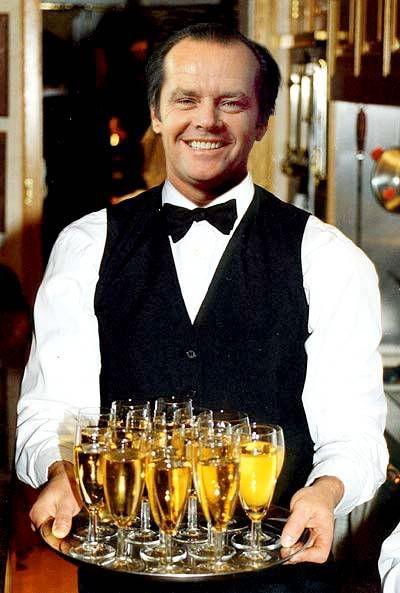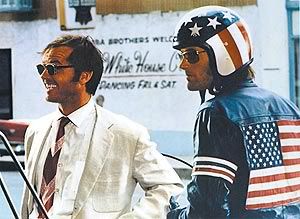 TV
TV In Which Luck Appears So Slick As To Become Sterile
 Monday, December 19, 2011 at 10:30AM
Monday, December 19, 2011 at 10:30AM 
Running the Numbers
by ALICE BOLIN
Luck
creator David Milch
 HBO’s new series Luck is Dustin Hoffman’s crack at the trope of the weary gangster, and he is just as punchy, tired, and insecure as you would, I guess, hope. The show begins as his character, the crooked businessman Chester “Ace” Bernstein, is released from prison after serving three years for unspecified dirty dealings. That same day, he visits a former partner at the man’s swanky nightclub, and during the course of their meeting, Ace moves with weird efficiency through the entire emotional range of the archetypal aging crook.
HBO’s new series Luck is Dustin Hoffman’s crack at the trope of the weary gangster, and he is just as punchy, tired, and insecure as you would, I guess, hope. The show begins as his character, the crooked businessman Chester “Ace” Bernstein, is released from prison after serving three years for unspecified dirty dealings. That same day, he visits a former partner at the man’s swanky nightclub, and during the course of their meeting, Ace moves with weird efficiency through the entire emotional range of the archetypal aging crook.
He is first full of self-doubt — “Sometimes I wonder if I’m still an asset,” he admits. Then in a fit of defensive anger, he leaps from his chair and rips his shirt open, shouting the delightful reproach “You got qualms?” He is instantly sheepish about the tantrum and is considerate enough to explain for the audience what has just happened. “I tore the buttons off my goddamn shirt,” he says. “I make a fool out of myself first day out.” For the rest of the scene, he is sure to remind us that he is old — I can’t think of a more crotchety remark than “My blood pressure is sky-high right now” — and prison has withered him both emotionally and physically. “I shrunk. I’ve got to get new shirts,” he says, awkwardly lying to cover the fact that his shirts are probably all missing buttons from his Incredible Hulk outbursts.

Ace exemplifies Luck’s most striking characteristic, that it is ambiguous and complex at the same time that it avoids any kind of subtlety. The first episode, directed by Heat's Michael Mann, introduces no fewer than sixteen characters, all connected in some way with horse racing at Santa Anita Park in Los Angeles. The audience must keep track of a huge volume of characters, their relationships to one another, and their many concealed interests. This is, I think, the point.
Add to that the difficulty of any story involving gambling: it will eventually require the audience to attempt to comprehend strategy, statistics, and large sums of money. This show with nothing but principal characters, many of whom have no name and only the vaguest of back stories, about the most obscure aspects of an obscure sport, egregiously also includes math.

Much of the first episode revolves around a group of gamblers’ pursuit of a huge Pick Six jackpot and their strategy for winning it, which hinges on betting on a single horse in the fourth race — apparently a pretty bold move. The discussion of “singling the fourth” is the most technical dialogue in the episode, so baffling that I was almost thankful that the characters discussing it are so obvious.
The gamblers are singularly pathetic — their ringleader is confined to a wheelchair, punctuating his conversation by huffing from an oxygen tank. They are of that special breed of loser geniuses who populate the minds of movie and television writers, convinced that smart-but-not-successful is a reliable shortcut to interesting. When one of the gamblers cheerily approaches the others and says, “Got my Social Security, 125 simoleons!” it’s clear that “fresh” isn’t necessarily what Luck is going for.

The show relies on characterizations that are easily shorthanded: The Irish Jockey, The Stuttering Agent, The Handsome Gambler. The most frequent method for this is to give a character an accent or vocal tic, making them more cartoonish while, in true Luck style, making their stories harder to follow. The writing seems aware of this — a jockey with a strong Cajun accent says of the Hispanic horse trainer Escalante, “He foreign. He a little hard to understand.” The show laughs at itself but also at its audience, who are trying to figure out what the fuck is going on. Characters often comment on how overt the characterizations are — Escalante calls The Stuttering Agent "Porky Pig", and Ace calls Escalante "Desi Arnaz". The Handsome Gambler refers to a money-lending racetrack security guard as Shylock, and it’s like, “You might be flattering yourself about your use of archetypes, Luck.”
Still, this self-awareness might be the show’s greatest hope to provide its characters with nuance. Ace has bought a racehorse covertly, holding it in the name of his driver, manservant, and main thug whom he calls “the Greek.” When the Greek visits the stables to check on the horse, Escalante flatters and fawns on him, saying “I’ll call you ‘El Natural.’” “I’ll call you ‘El Bullshitter,’” the Greek replies. Other characters also hint that Escalante might be laying it on thick — “He’s serving it up to the Gringo owners and trainers, cold,” says a racetrack official. Escalante is known not only for his talent as a trainer but his savvy; he is able to control people’s expectations of him and his horses. He and others in Luck are consciously performing, playing into their perceived roles as a way of hiding their true motivations.

The show also finds ways to acknowledge how confounding its subject matter can be. One of the gamblers’ backers (a male prostitute who wears a boater hat and brags that his clients call his penis “the Emperor,” I feel compelled to report) is bewildered by the Pick Six scheme. During the climactic eighth race, he says, “I don’t get it. We bet every horse, who do we want?” forcing them to reiterate the stakes of the scene. “Will someone please tell me what’s going on?” he whines as they are about to win the two million dollar jackpot. His cluelessness provides the audience with a point of connection in a world that is opaque with lingo, calculations, and specialized knowledge. When he speaks our confusion on the screen, it feels like a moment of mercy.
Luck’s other saving grace is its sophisticated visuals. It is shot beautifully and deliberately, with contrasting styles and palettes for the intersecting domains of the show. Ace exists in a silent world of glass, chrome, marble, and granite. The scenes at the racetrack, by contrast, are frenetic and colorful, and the racetrack setting brilliantly incorporates contrasting visual elements. The grimy stands open onto the vibrant scenery that frames the outdoor track: palm trees, hills, the sky and white sunlight. Nick Nolte’s character, the gentle horse trainer just called “the Old Man,” brings a bit of the pastoral with him by force of spirit. We find him in a green space behind the stables saying to his horse in a gravelly coo, “You don’t know how special you are, do you?” The bucolic scene seems distant from the rest of the track, which is shot with such intensity.

But danger lurks in Luck’s temptation toward the music video effect — the reliance on montage editing, slow motion, and loud music cues, especially in the race scenes, can be so slick as to become sterile. There is a gut-turning slow-motion shot of a horse’s leg snapping in the last race, but the scene is so stylized that it is emotionally removed. As I watched the animal being put down with a giant syringe, I wondered to myself, “Are they seriously playing Sigur Rós right now?”
The first episode of Luck abounds with agonizing dramatic irony. In the last scene, when Ace tells the Greek, “I don't trust anyone, not even myself. You, I give a pass,” we get the feeling that a little too much might be hanging on this relationship. “Alls I’m worried is you relying on me when I’m working out past my depth,” says the Greek, and he almost certainly has reason to be worried. The gamblers’ storyline ends with them discussing grand plans for what they will do with their two million dollar jackpot and ominously deciding not to come forward with the winning ticket until the next day. The Handsome Gambler sings “America the Beautiful” as he watches the final race and it’s clear no one should give these fuck-ups two million dollars. The teaser for the rest of the first season, in addition to introducing five new characters (!), promises a yacht, a bloody ashtray, lines of cocaine, and large wads of money. It’s easy to say what will become of Luck’s dozen plus protagonists: nothing good.
Alice Bolin is the senior contributor to This Recording. She is a writer living in Missoula. She tumbls here and twitters here. She last wrote in these pages about Martha Marcy May Marlene. You can find an archive of her writing on This Recording here.

"Golden Touch" - Araab Muzik (mp3)
"Free Spirit" - Araab Muzik (mp3)
"Electronic Dream" - Araab Muzik (mp3)

 alice bolin,
alice bolin,  david milch,
david milch,  dustin hoffman,
dustin hoffman,  luck
luck 




















































